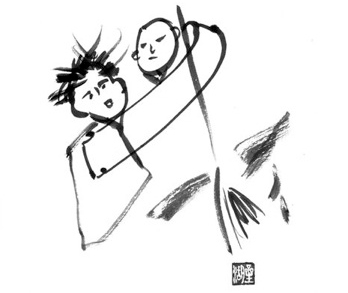CASE #4: One-Page Dharma
The Venerable Kyobutsu said: “Words of the Dharma for the person aspiring to the world beyond will not exceed a single page.”

Kanzan and Jitoku Holding an Empty Scroll, by Seiko Morningstar
BACKGROUND:
Kyobutsu—A 13th century Japanese hijiri (wanderer monk). In spite of the fact that he is the most well-represented figure in the Ichigon-hodan (“One-Word Talks Fragrant with the Dharma”), the most famous collection of Pure Land teachings from the Kamakura period, little is known of his life.
Words of the Dharma—Written teachings, either the sutras themselves or the writings of later Buddhist masters.
The World Beyond—The Western Pure Land of Amitabha, the Buddha of Infinite Light and Life. Pure Land devotees recite Namu-amida-butsu, the name of Amitabha, with the aspiration to be reborn in his land.
COMMENTARY:
For 2,000 years Pure Land devotees have aspired to “the world beyond.” But in reality that world is this world. What separates them is the thickness of a single sheet of paper, nothing more.
The Heart Sutra says, “The Bodhisattva relies on Prajnaparamita, with no walls in the mind. No walls, therefore no fear.”
Question: What kind of walls exist only in the mind?
Answer: Nothing real separates the Pure Land from the land we live in now.
Question: What could be the point of getting the teaching down to almost nothing?
Answer: A “One-Word Talk” lies that much closer to Nature—not yet in it, but you can see it from there.
VERSE:
A child’s paper dolls—
Isn’t it sad how they hold
One another’s hands?
They don’t know they’ve been folded
To impersonate a world.
Further Reading:
Green Koans Case 1: Shakyamuni Touches the Earth
Green Koans Case 2: Shantideva’s Sword
Green Koans Case 3: The Great Compassionate One’s True Eye
Green Koans Case 4: One-Page Dharma
Green Koans Case 5: The Person of the Way
Green Koans Case 6: The Green Yogi
Green Koans Case 7: Rain of the Law
Green Koans Case 8: Bashō’s Last Words
Thank you for subscribing to Tricycle! As a nonprofit, we depend on readers like you to keep Buddhist teachings and practices widely available.